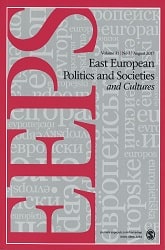The Axiological Clash as a Key Determinant of Expanded and Destructive Political Conflict in Poland
The Axiological Clash as a Key Determinant of Expanded and Destructive Political Conflict in Poland
Author(s): Piotr RadkiewiczSubject(s): Political Philosophy, Governance, Political behavior, Political psychology, Crowd Psychology: Mass phenomena and political interactions, Sociology of Politics, Peace and Conflict Studies
Published by: SAGE Publications Ltd
Keywords: axiological clash; expanded and destructive political conflict; collective mentality; political ideology; basic human values;
Summary/Abstract: This article examines the phenomenon of strong political conflict that takes place in Poland. It may be argued that because of its intensity, a level of excited emotions, and antagonizing effects on interpersonal relationships, it exhibits clear characteristics of the expanded and destructive conflict. This phenomenon is also reflected in the deepening bipolar division within the Polish electorate. The proposed theoretical perspective posits that the most important psychological source of this conflict should primarily be sought in the clash of two antagonistic axiological systems preferred by conflicting electorates and represented by two rival parties: Civic Platform and Law and Justice. Based on a survey study (N = 750) conducted on a representative sample of Poles, it was shown that the representatives of both electorates were indeed located at two, in the psychological sense, opposite extremes. The typical mental profile of a Civic Platform follower is purely individualistic (preference for openness to change and selfenhancement human values) and is accompanied by a political ideology that combines cultural leftism and economic rightism. On the other hand, the typical profile of a Law and Justice follower can be described as purely communal (preference for conservation and self-transcendence human values), combining culturally right and economically left postulates. The mental characteristics of conflicting electorates are discussed in the context of Poland’s past and contemporary sociopolitical experiences, as well as the fundamental rivalry between two inherently antagonistic views on democracy: liberal and communitarian.
Journal: East European Politics and Societies
- Issue Year: 31/2017
- Issue No: 02
- Page Range: 382-401
- Page Count: 20
- Language: English
- Content File-PDF

